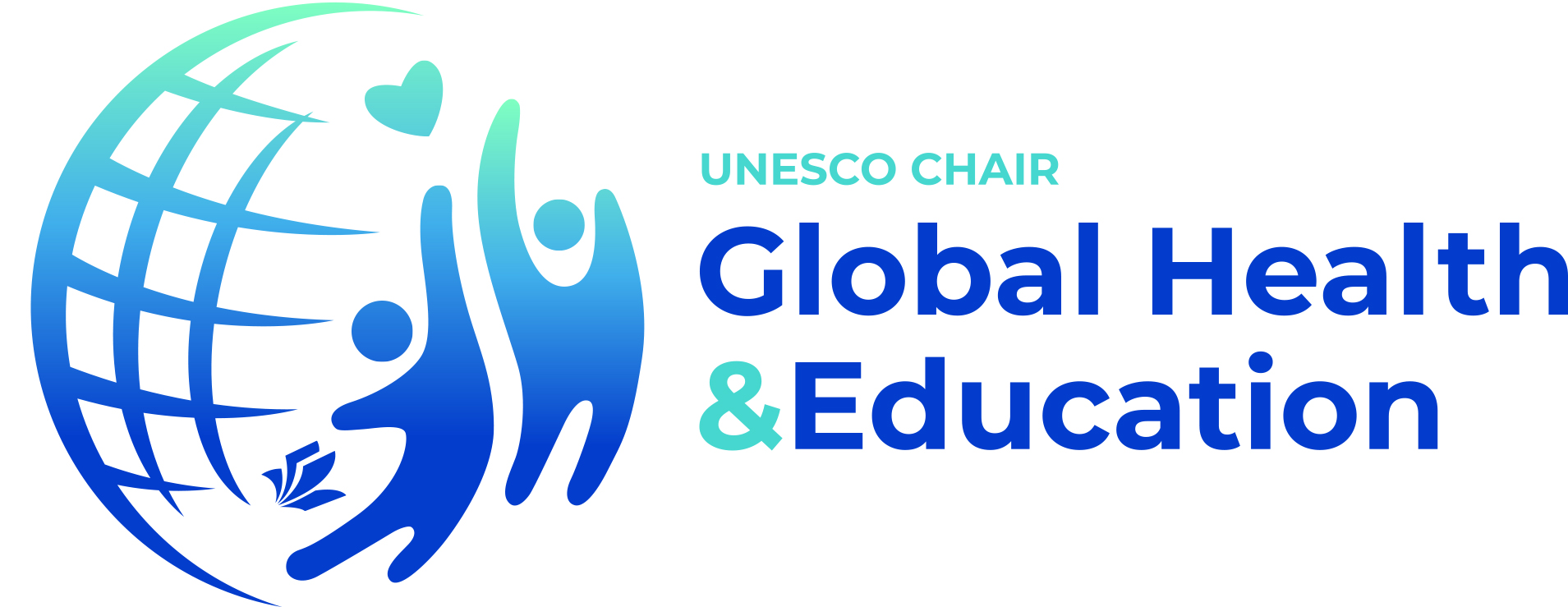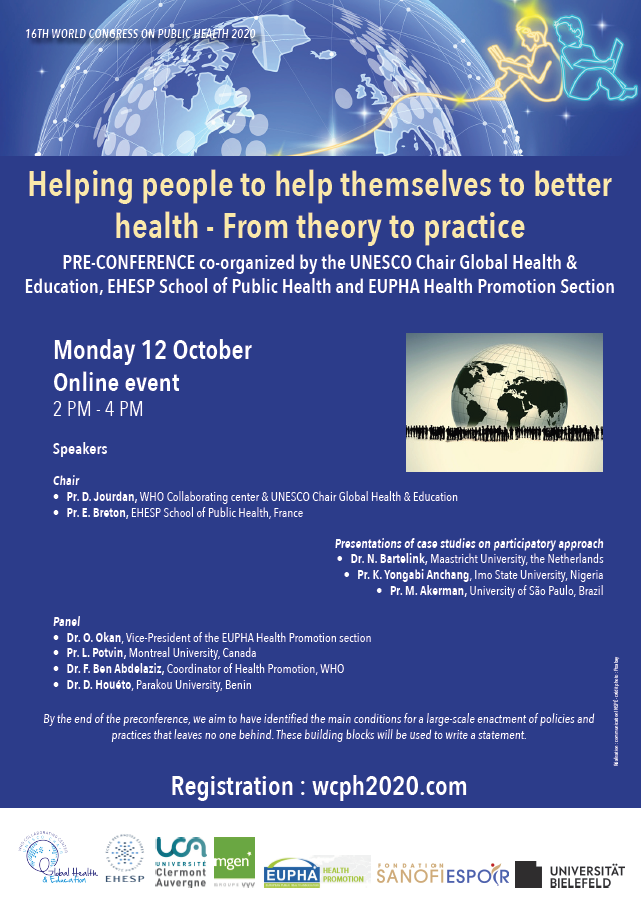On Monday 12 October 2020 the online pre-conference “Helping people to help themselves to better health – From theory to practice” took place. This pre-conference was part of the virtual 16th World Congress on Public Health. The pre-conference was organized by the WHO Collaborating Centre & UNESCO Chair Global Health & Education, EUPHA Health Promotion Section and EHESP School of Public Health.
Introduction
The 2020 World Congress on Public Health offers an opportunity to reflect on the contribution of the public health community (people, institutions, knowledge, approaches, methods…) to advancing the UN Sustainable Development Goals (SDGs). Public health brings an original perspective based on almost two centuries of research, policies and practices on population health and living conditions far beyond health care.
Public health offers a strategic approach that aims to orient and support social change in order to improve living conditions for all and reduce health inequities. Such an approach based on coordinated intersectoral policies and actions should be built with people, not against them. Good knowledge of health determinants, social practices, cultures and the active involvement of the people themselves are key factors of effectiveness and sustainability. In order to be prepared for the future large-scale implementation, policies and practices are needed that target both people’s ecosystems and agencies.
However, when looking at public health conferences such as organised by EUPHA or WFPHA, one still regularly comes across presentations that do not mention the role of the upstream determinants and the existence of a social gradient characterizing the distribution of behaviour-related risk factors. They hardly ever report on the inequitable distribution of resources and the overemphasis on individual behaviour that leads to blaming the victims.
How can we ensure policies and programmes take into account what is known from environmental determinants and health inequities in a participative manner? How can we realise concrete actions that are more than wishful thinking? Two promising answers that public health could offer are the implementation of the principles of health promotion and the recommendations of the WHO Commission on the social determinants of health (SDH).
Building on the fruitful discussion we had on intersectoral approaches during the 2019 European Public Health Conference in Marseille, we will continue our discussions by engaging and expanding our network of participants on the ethical and operational aspects of these answers.
Objectives
The pre-conference will result in a statement with the main conditions for large-scale implementation of policies and practices that leave no one behind, by reviewing the evidence and learning from innovations in the field.
More specifically, our objectives are to describe and reflect on:
- available evidence on the mechanisms underpinning participation, non-participation and victim-blaming;
- factors explaining the over-investment in interventions targeting individual determinants of health at the expense of actions on the SDH;
- innovations in participatory community-based interventions that improve daily living conditions and indicators of health and well-being;
- enablers and barriers to scaling-up health promotion and community-based approaches.
Next to these objectives, we wish to create a space that supports international networking among professionals and researchers interested in advancing participatory community-based public health interventions. This is at the core of the activities of the UNESCO Chair Global Health & Education and of the EUPHA Health Promotion Section.
سخنرانان
Speakers were:
- Pr. Didier Jourdan, WHO Collaborating Center & UNESCO Chair Global Health & Education
- Pr. Eric Breton, EHESP School of Public Health, France
- Goof Buijs, WHO Collaborating center & UNESCO Chair Global Health & Education
- Dr. Nina Bartelink, Faculty of Health, Medicine and Life Sciences, Maastricht University, the Netherlands
- Pr. Marco Akerman, School of Public Health, University of São Paulo, Brazil
- Dr. Orkan Okan, Vice-President of the EUPHA Health Promotion section, Interdisciplinary Centre for Health Literacy Research, Bielefeld University, Germany,
- Pr. Louise Potvin, School of Public Health, Université de Montréal, Canada
- Dr. David Houéto, President of RÉFIPS, School of Public Health, Parakou University, Benin
- Dr. Faten Ben Abdelaziz, Coordinator of Health Promotion, WHO
Contribute to the statement
You are all invited to share your experience by answering two short questions before 30 October 2020 and contribute to the pre-conference statement on large-scale implementation of policies and practices that leave no one behind.
- Question 1: What explains the priority to invest in programmes and policies targeting individuals, rather than upstream social determinants of health?
- Question 2: How can we contribute to scaling-up health promotion and community-based approaches?
Answer these questions or contribute directly to the scrumble board.
منابع


Bartelink N. Evaluating health promotion in complex adaptive school systems: The Healthy Primary School of the Future. Maastricht: Maastricht University; 2019.
Bartelink, N., van Assema, P., Kremers, S., Savelberg, H., Oosterhoff, M., Willeboordse, M., van Schayck, O, Winkens, B., & Jansen, M. Can the Healthy Primary School of the Future offer perspective in the on-going obesity epidemic in young children? – A quasi-experimental study. BMJ open. 2019;9(10).
Bartelink, N., van Assema, P., Kremers, S., Savelberg, H., Gevers, D., & Jansen, M. Unravelling the effects of the Healthy Primary School of the Future: For whom and where is it effective? Nutrients. 2019;11(9),2119.
Bartelink, N., van Assema, P., Jansen, M., Savelberg, H., & Kremers, S. The moderating role of the school context on the effects of the Healthy Primary School of the Future. Int J Environ Res Public Health. 2019;16(13),2432.
Bartelink N, van Assema P., Jansen M., Savelberg H., Moore G., Hawkings J., & Kremers S. Process evaluation of the Healthy primary School of the Future: The key learning points. BMC Public Health. 2019;19(1):698.
Bartelink, N., van Assema, P., Kremers, S., Savelberg, H., Oosterhoff, M., Willeboordse, M., van Schayck, O, Winkens, B., & Jansen, M. One-and two-year effects of the Healthy Primary School of the Future on children’s dietary and physical activity behaviours: A quasi-experimental study. Nutrients. 2019;11(3):689.
Bartelink N., van Assema P., Jansen M., Savelberg H., Willeboordse M., & Kremers S. The Healthy Primary School of the Future: A Contextual Action-oriented Research Approach. Int J Environ Res Public Health. 2018;15(10):2243





